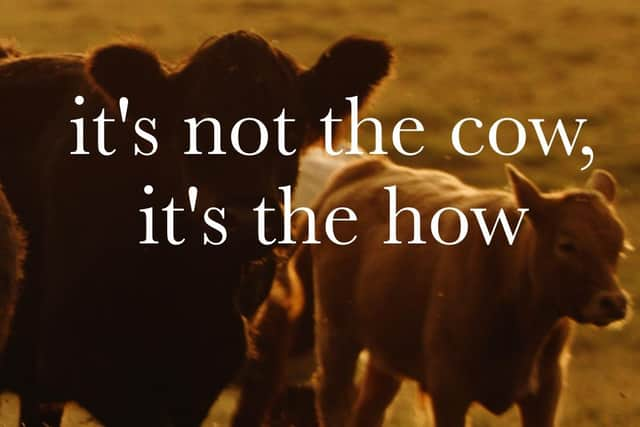Farmers will find a lot to love in new film The Holy Cow - Brian Henderson


I was alerted a week or two ago to a collaboration between an arthouse film studio and a butcher in the north of England on the production of a short film entitled The Holy Cow which looks at the story of heritage beef production.
I managed to find time to watch it and, despite the distractions of lambing and calving at this time of year, the film remains fresh in my mind as its approach struck a chord with my own thinking and I’m pretty sure it would chime with that of many farmers in Scotland.
Advertisement
Hide AdAdvertisement
Hide AdIt was quite a departure from the normal portrayal of the livestock industry – certainly a stark contrast to much of the output seen on many of the major TV channels where the fashion to vilify beef and other meat production sees livestock farmers blamed for everything from welfare issues to global warming.
It also breathed a bit of fresh air into the debate when compared to the approach taken by most of the industry’s meat promotion bodies.
For these organisations seem to focus on not offending anyone and rely heavily on bright and cheery ‘infographics’ using animal silhouettes in primary colours, filled with bullet points which often teeters on the verge of infantilising the issue – while the film takes a much more grown-up approach and addresses a lot of the underlying issues of proper meat production which are seldom spoken about or aired in public.
In fact the film even uses the normally taboo “D” word (death) several times, an issue which is almost universally avoided in mainstream marketing and promotion – yet it is a significant factor.
It is portrayed in The Holy Cow in a wholly sensible and adult way and doesn’t dodge the fact that it is undeniably a necessary part of the red meat chain – but it was both refreshing and reassuring to see the issue addressed by people who treat the animals with huge respect and with full consideration for their welfare at all parts of the production cycle, right down to the slaughterman.
And this was a key part of the film – highlighting a key difference between the traditional husbandry practices used on the UK’s small and family farms where animals are viewed as individuals and treated accordingly – an approach which is in direct contrast to the approach adopted by many of the feed-lot type enterprises where animals can become little more than a contributing factor the bottom line of the profit and loss balance sheet.
The “cast”, too, were real characters, in all senses of the term and they portray the care and regard they have for their stock and the land without this coming over as either overly-sentimental or forced. And, curiously, while the farmer avoided being Mr Nicey-nicey, his slight acerbic edge somehow managed to amplify his regard for his animals.
On top of that, the links provided by a philosopher was another stroke of creativity and deepened the narrative, giving it an underlying thoughtfulness which helped to validate the overall message.
Advertisement
Hide AdAdvertisement
Hide AdThe cinematography, too, was in a league of its own for projects such as this – a tasteful, artful portrayal which manages to capture the dramatic yet sometimes unforgiving landscape and scenery in which it was shot.
So I was pretty impressed by the whole film which took a new direction while managing to avoid the many pitfalls which the BBC’s Countryfile, with its constant “chocolate-box” portrayal of the countryside which it seems to fall into every week, leaving countless farmers everywhere raging at the TV!
The film is a well structured, unsentimental and accurate portrayal of many of the country’s family farms, where heritage and tradition counts for something – which throws light on the sort of people who go about their work with a care and respect for their animals and their land which often goes unappreciated by society as a whole.
And at a time when the whole livestock industry is up against unremitting pressure, differentiating between the truly artisan approach to livestock production which is still the norm on most UK farms and the corporate-driven, commodity practices adopted in other countries can only help save the sector.
Comments
Want to join the conversation? Please or to comment on this article.